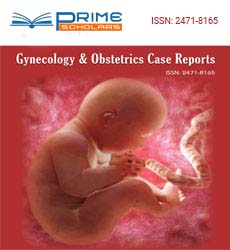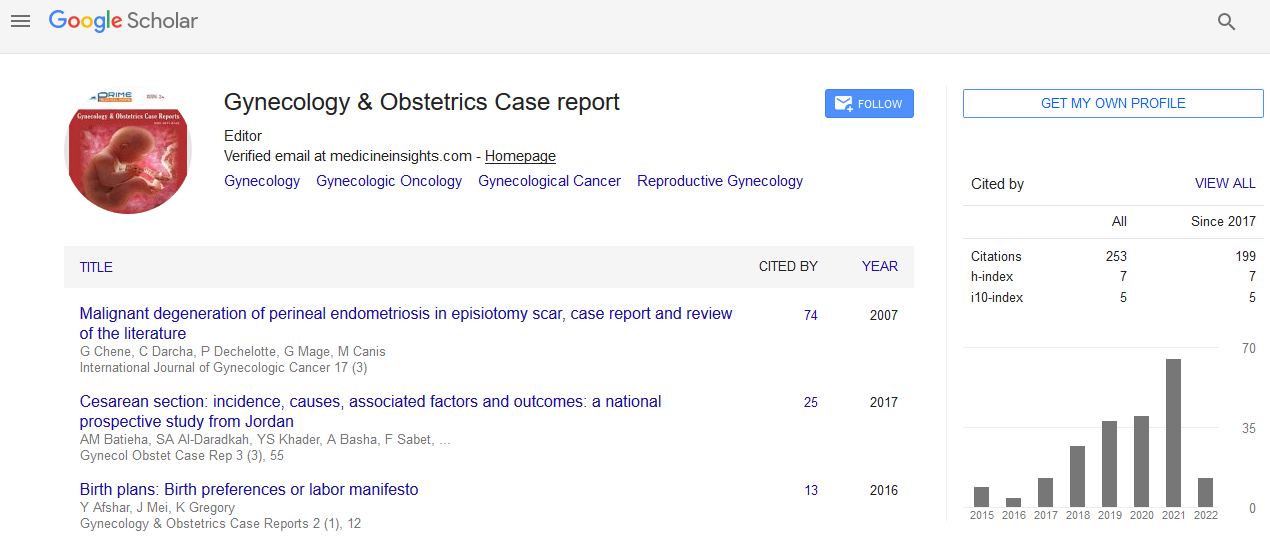Short Communication - (2025) Volume 11, Issue 1
Ethical Challenges in Fetal Genetic Testing and Screening
Sara Rayan*
Department of Women’s Health, Regional University of Cariri, Crato 63105-2458, CE, Brazil
*Correspondence:
Sara Rayan, Department of Women’s Health, Regional University of Cariri, Crato 63105-2458, CE,
Brazil,
Email:
Received: 27-Dec-2024, Manuscript No. ipgocr-25-22699;
Editor assigned: 30-Dec-2024, Pre QC No. ipgocr-25-22699(PQ);
Reviewed: 10-Jan-2025, QC No. ipgocr-25-22699(Q);
Revised: 17-Jan-2025, Manuscript No. ipgocr-25-22699(R);
Published:
24-Jan-2025
INTRODUCTION
Fetal genetic testing and screening are key advancements in prenatal care, offering parents and healthcare providers important insights into the genetic makeup of an unborn child. These tests are used to assess the likelihood of certain genetic conditions, such as Down syndrome, cystic fibrosis and other chromosomal abnormalities, by analyzing the fetus's DNA. However, as the technology behind these tests continues to evolve, so too does the ethical landscape surrounding their use. Ethical dilemmas surrounding fetal genetic testing and screening raise concerns about privacy, informed consent, the potential for discrimination and the societal implications of reproductive choices [1].
One of the central ethical concerns in fetal genetic testing is the issue of informed consent. Parents must fully understand the purpose, potential outcomes and limitations of these tests before deciding to undergo them. However, there is often a lack of clarity in the information provided to expectant parents, leading to decisions made based on incomplete or misunderstood knowledge. In some cases, parents may feel pressured into undergoing these tests due to societal or familial expectations, or may fear the emotional burden of not knowing the genetic status of their unborn child. Moreover, healthcare professionals may not always present a balanced view of the potential outcomes, focusing on the benefits of detecting genetic conditions without adequately addressing the emotional and ethical consequences of those results [2].
Another significant ethical challenge lies in the potential for discrimination based on genetic findings. Fetal genetic tests can reveal not only the risk of specific genetic disorders but also information about a childâ??s predisposition to other conditions later in life, such as certain types of cancer or neurological disorders. This raises the possibility of genetic discrimination, where individuals might face biases or stigmatization based on their genetic profile. The ethical implications of genetic information extend beyond the individual child to the family as whole, as genetic tests can reveal information about parents and extended relatives that they may not wish to disclose. The possibility of such sensitive information being used to discriminate against individuals, whether in the context of healthcare, education, or employment, highlights the need for strong legal protections against genetic discrimination.
DESCRIPTION
Furthermore, the availability of fetal genetic testing also brings into question the issue of reproductive autonomy. While these tests provide expectant parents with the opportunity to make informed decisions about the future of their pregnancy, they also raise concerns about the societal pressure to make certain reproductive choices. For example, if a genetic test reveals a high likelihood of a serious condition, parents may face societal expectations to terminate the pregnancy. This creates a tension between the parentsâ?? right to choose the course of action that is best for their family and the broader societal pressure to make decisions based on perceived quality of life. Ethical questions also arise in the context of selective abortion, especially in cases where the condition is not fatal, but the child may face challenges later in life. The debate centers on whether it is ethical to abort a fetus based on its genetic predisposition to conditions that are not immediately life-threatening but may affect its quality of life or the family's ability to provide care [3].
Another challenge is the potential for eugenic practices, where genetic testing is used not just to identify and avoid serious genetic conditions, but also to select for desirable traits, such as intelligence, physical appearance, or athletic ability. Although such practices are not yet widespread, the possibility of using genetic testing to make subjective decisions about the ideal characteristics of a child raises significant ethical concerns. It challenges our fundamental notions of human dignity and equality, as it could lead to the creation of a society in which individuals are valued based on their genetic makeup rather than their inherent worth as human beings. The ethical implications of such practices are profound, raising questions about the social and psychological impact of living in a world where people are selectively bred to meet particular ideals [4].
The issue of privacy is also critical in the context of fetal genetic testing. The information generated by these tests is highly personal and sensitive and its confidentiality must be protected. However, the rise of digital health technologies and the use of cloud-based storage systems to manage genetic data increase the risk of breaches in privacy. There is a danger that genetic information could be accessed or misused by unauthorized parties, leading to potential harm to the individual or family involved. Moreover, as genetic testing becomes more accessible and widespread, there is a growing concern that such information could be commodified, with companies or institutions gaining access to sensitive genetic data without clear consent from the individuals involved. This could lead to the exploitation of genetic information for financial or commercial purposes, further complicating the ethical landscape. Finally, the evolution of prenatal genetic testing challenges our societal views on disability. As more conditions are detectable through fetal genetic testing, the potential for a society that values certain traits over others becomes more pronounced. The choice to terminate a pregnancy based on the detection of a genetic disorder reflects a larger societal view on disability, one that may not fully appreciate the value of individuals with disabilities. While parents may make decisions based on their ability to care for a child with special needs, such choices often reflect societal attitudes that devalue the lives of people with disabilities. This creates a dangerous precedent, one that could lead to the marginalization of those with genetic conditions or disabilities and further entrench the belief that certain lives are not worth living [5].
As fetal genetic testing continues to evolve, it is critical that ethical frameworks evolve alongside it. Ethical guidelines should prioritize the autonomy and informed decision-making of parents while ensuring that the broader societal implications of these tests are carefully considered. Healthcare providers must be trained to communicate the complexities of genetic testing in a clear and unbiased way, empowering parents to make decisions that are right for them without undue pressure or influence. Furthermore, legal protections should be put in place to prevent genetic discrimination and protect the privacy of individuals undergoing genetic testing. The future of fetal genetic testing must balance the benefits of these advancements with a commitment to respecting human dignity, autonomy and equality.
CONCLUSION
Ultimately, fetal genetic testing and screening are tools that, when used responsibly and ethically, have the potential to improve prenatal care and outcomes for children. However, they also introduce a host of ethical challenges that require ongoing reflection and careful consideration. Society must engage in meaningful dialogue about the moral implications of these technologies to ensure that they are used in ways that respect the rights and dignity of all individuals, both before and after birth.
Acknowledgment
None.
Conflict of Interest
None.
REFERENCES
- He L, Bulanova D, Oikkonen J, Häkkinen A, Zhang K, et al. (2021) Network-guided identification of cancer-selective combinatorial therapies in ovarian cancer. Brief Bioinform 22(6):bbab272.
Google Scholar Cross Ref Indexed at
- Nero C, Vizzielli G, Lorusso D, Cesari E, Daniele G, et al. (2021) Patient-derived organoids and high grade serous ovarian cancer: from disease modeling to personalized medicine. J Exp Clin Cancer Res 40(1):1-4.
Google Scholar Cross Ref Indexed at
- Wethington SL, Wahner-Hendrickson AE, Swisher EM, Kaufmann SH, Karlan BY, et al. (2021) PARP inhibitor maintenance for primary ovarian cancer–A missed opportunity for precision medicine. Gynecol Oncol 163(1):11-13.
Google Scholar Cross Ref Indexed at
- Chandra A, Pius C, Nabeel M, Nair M, Vishwanatha JK, et al. (2019) Ovarian cancer: Current status and strategies for improving therapeutic outcomes. Cancer Med 8(16):7018-7031.
Google Scholar Cross Ref Indexed at
- Fernandez-Garza LE, Dominguez-Vigil IG, Garza-Martinez J, Valdez-Aparicio EA, Barrera-Barrera SA, et al. (2021) Personalized Medicine in Ovarian Cancer: A Perspective from Mexico. World J Oncol 12(4):85.
Google Scholar Cross Ref Indexed at
Citation: Rayan S. (2025) Ethical Challenges in Fetal Genetic Testing and Screening. Gynecol Obstet Case Rep. Vol.11 No.1:07.
Copyright: © Rayan S. This is an open-access article distributed under the terms of the Creative Commons Attribution License, which permits unrestricted use, distribution and reproduction in any medium, provided the original author and source are credited.

